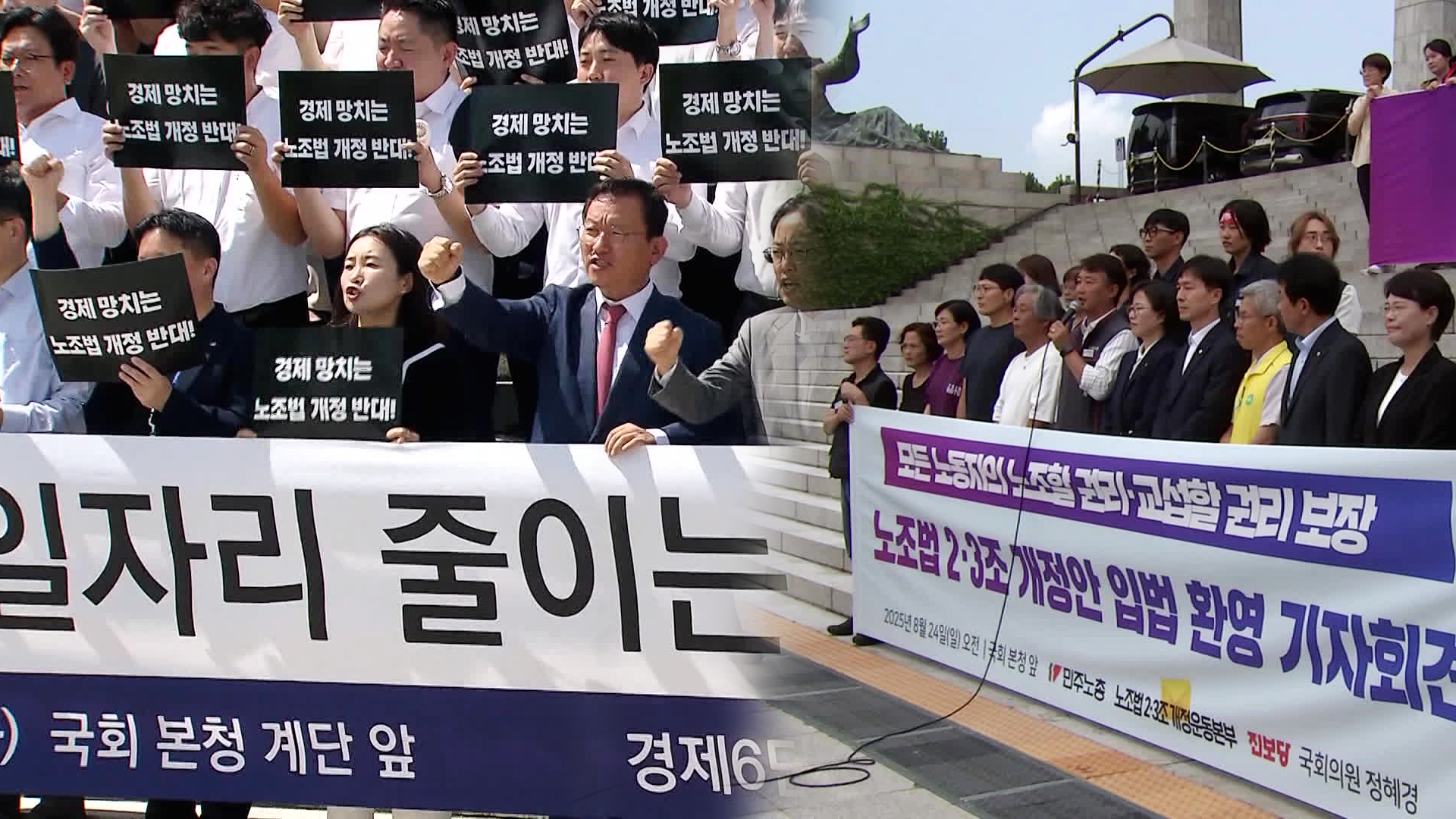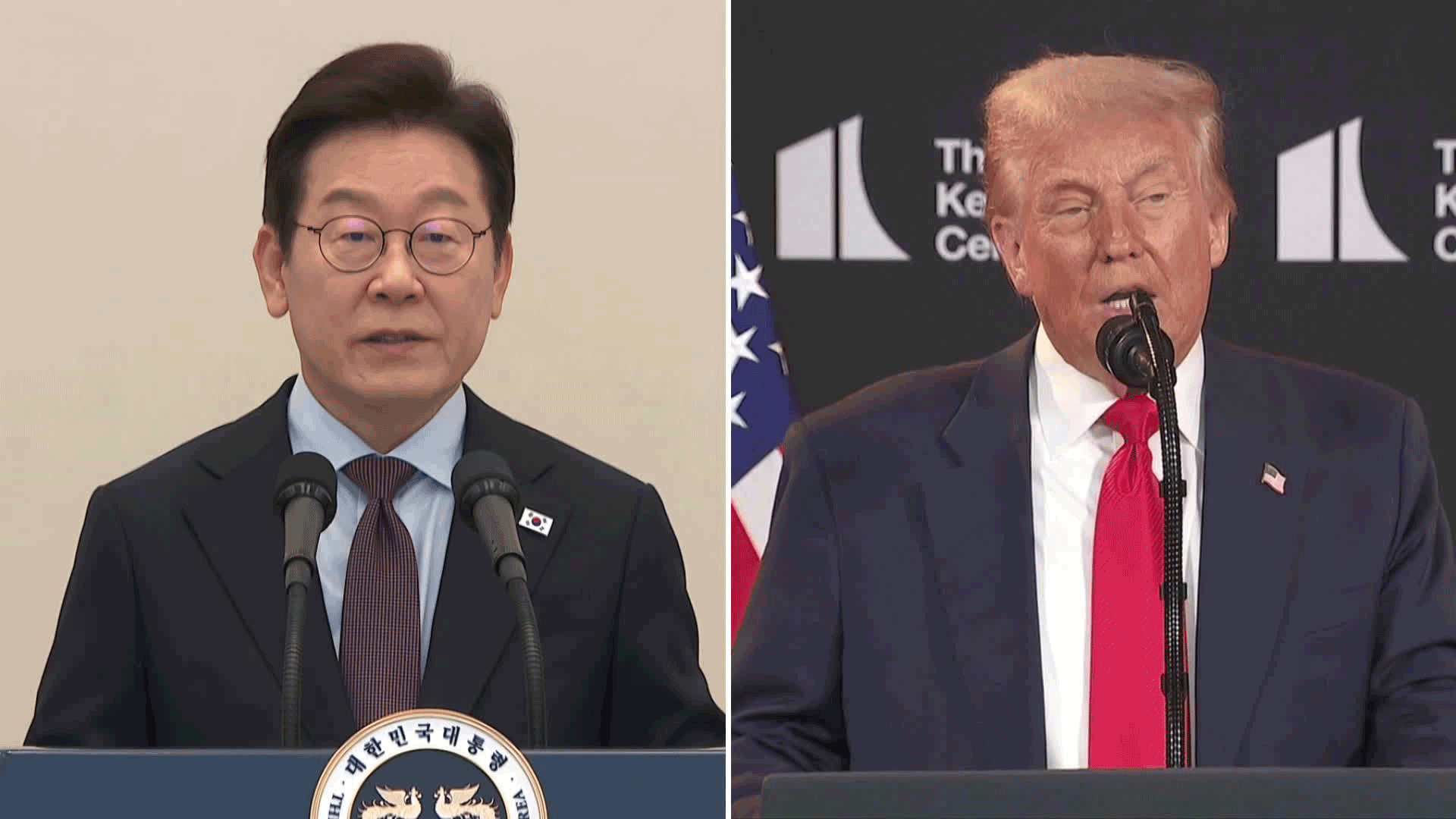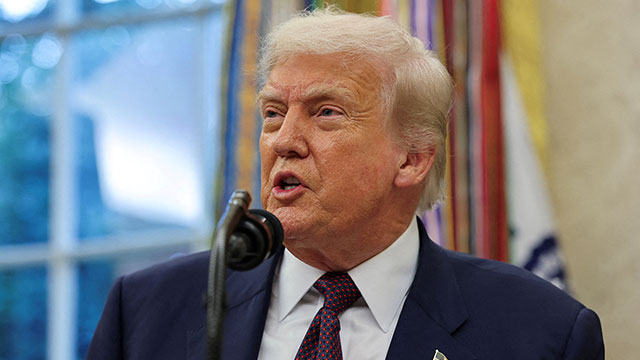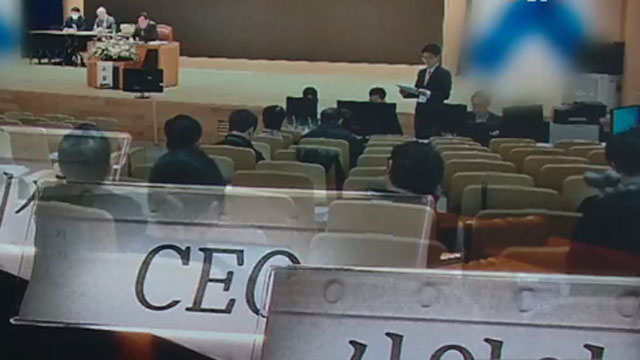[Anchor]
The moment the Yellow Envelope Law passed the National Assembly's plenary session, the Korean Confederation of Trade Unions watched from the gallery.
The reactions from the labor and business sectors are sharply divided.
Kim Min-kyung reports.
[Report]
The so-called 'Yellow Envelope Law' amends Articles 2 and 3 of the Labor Union Act, and it contains three key provisions.
First, it expands the definition of "employer."
Subcontracted workers can now demand direct negotiations with the primary contractor.
The scope of labor disputes, or strikes, will also be expanded to include 'management decisions that affect working conditions.'
Companies are now restricted from claiming damages against striking workers.
This strengthens the protection of workers.
The business sector, which opposed the law until the end, expressed strong regret.
There are concerns that both domestic and foreign-invested companies may choose to leave Korea.
Earlier, it was reported that GM Korea mentioned a 're-evaluation of its Korean operations,' reigniting rumors of a potential withdrawal.
[Hwang Yong-yeon/Korea Enterprises Federation Labor Policy Director: "Foreign businesspeople are quite burdened by this uncertainty and the potential for criminal penalties."]
The labor sector evaluated that "the right to negotiate for all workers has been enshrined in law."
[Yang Kyung-soo/Chairman of the Korean Confederation of Trade Unions: "I believe this is the result of the voices of workers who cried out to at least see the face of the primary contractor and create space for negotiation..."]
The Ministry of Employment and Labor pushed back, saying the business sector’s concerns are excessive.
They plan to gather opinions from labor and management and establish guidelines to minimize uncertainty.
Some point out that confusion on the ground is inevitable until labor commission or court precedents are established.
The Yellow Envelope Law will take effect six months after a grace period.
This is KBS News, Kim Min-kyung.
The moment the Yellow Envelope Law passed the National Assembly's plenary session, the Korean Confederation of Trade Unions watched from the gallery.
The reactions from the labor and business sectors are sharply divided.
Kim Min-kyung reports.
[Report]
The so-called 'Yellow Envelope Law' amends Articles 2 and 3 of the Labor Union Act, and it contains three key provisions.
First, it expands the definition of "employer."
Subcontracted workers can now demand direct negotiations with the primary contractor.
The scope of labor disputes, or strikes, will also be expanded to include 'management decisions that affect working conditions.'
Companies are now restricted from claiming damages against striking workers.
This strengthens the protection of workers.
The business sector, which opposed the law until the end, expressed strong regret.
There are concerns that both domestic and foreign-invested companies may choose to leave Korea.
Earlier, it was reported that GM Korea mentioned a 're-evaluation of its Korean operations,' reigniting rumors of a potential withdrawal.
[Hwang Yong-yeon/Korea Enterprises Federation Labor Policy Director: "Foreign businesspeople are quite burdened by this uncertainty and the potential for criminal penalties."]
The labor sector evaluated that "the right to negotiate for all workers has been enshrined in law."
[Yang Kyung-soo/Chairman of the Korean Confederation of Trade Unions: "I believe this is the result of the voices of workers who cried out to at least see the face of the primary contractor and create space for negotiation..."]
The Ministry of Employment and Labor pushed back, saying the business sector’s concerns are excessive.
They plan to gather opinions from labor and management and establish guidelines to minimize uncertainty.
Some point out that confusion on the ground is inevitable until labor commission or court precedents are established.
The Yellow Envelope Law will take effect six months after a grace period.
This is KBS News, Kim Min-kyung.
■ 제보하기
▷ 카카오톡 : 'KBS제보' 검색, 채널 추가
▷ 전화 : 02-781-1234, 4444
▷ 이메일 : kbs1234@kbs.co.kr
▷ 유튜브, 네이버, 카카오에서도 KBS뉴스를 구독해주세요!
- Labor law reform sparks division
-
- 입력 2025-08-24 23:47:05

[Anchor]
The moment the Yellow Envelope Law passed the National Assembly's plenary session, the Korean Confederation of Trade Unions watched from the gallery.
The reactions from the labor and business sectors are sharply divided.
Kim Min-kyung reports.
[Report]
The so-called 'Yellow Envelope Law' amends Articles 2 and 3 of the Labor Union Act, and it contains three key provisions.
First, it expands the definition of "employer."
Subcontracted workers can now demand direct negotiations with the primary contractor.
The scope of labor disputes, or strikes, will also be expanded to include 'management decisions that affect working conditions.'
Companies are now restricted from claiming damages against striking workers.
This strengthens the protection of workers.
The business sector, which opposed the law until the end, expressed strong regret.
There are concerns that both domestic and foreign-invested companies may choose to leave Korea.
Earlier, it was reported that GM Korea mentioned a 're-evaluation of its Korean operations,' reigniting rumors of a potential withdrawal.
[Hwang Yong-yeon/Korea Enterprises Federation Labor Policy Director: "Foreign businesspeople are quite burdened by this uncertainty and the potential for criminal penalties."]
The labor sector evaluated that "the right to negotiate for all workers has been enshrined in law."
[Yang Kyung-soo/Chairman of the Korean Confederation of Trade Unions: "I believe this is the result of the voices of workers who cried out to at least see the face of the primary contractor and create space for negotiation..."]
The Ministry of Employment and Labor pushed back, saying the business sector’s concerns are excessive.
They plan to gather opinions from labor and management and establish guidelines to minimize uncertainty.
Some point out that confusion on the ground is inevitable until labor commission or court precedents are established.
The Yellow Envelope Law will take effect six months after a grace period.
This is KBS News, Kim Min-kyung.
The moment the Yellow Envelope Law passed the National Assembly's plenary session, the Korean Confederation of Trade Unions watched from the gallery.
The reactions from the labor and business sectors are sharply divided.
Kim Min-kyung reports.
[Report]
The so-called 'Yellow Envelope Law' amends Articles 2 and 3 of the Labor Union Act, and it contains three key provisions.
First, it expands the definition of "employer."
Subcontracted workers can now demand direct negotiations with the primary contractor.
The scope of labor disputes, or strikes, will also be expanded to include 'management decisions that affect working conditions.'
Companies are now restricted from claiming damages against striking workers.
This strengthens the protection of workers.
The business sector, which opposed the law until the end, expressed strong regret.
There are concerns that both domestic and foreign-invested companies may choose to leave Korea.
Earlier, it was reported that GM Korea mentioned a 're-evaluation of its Korean operations,' reigniting rumors of a potential withdrawal.
[Hwang Yong-yeon/Korea Enterprises Federation Labor Policy Director: "Foreign businesspeople are quite burdened by this uncertainty and the potential for criminal penalties."]
The labor sector evaluated that "the right to negotiate for all workers has been enshrined in law."
[Yang Kyung-soo/Chairman of the Korean Confederation of Trade Unions: "I believe this is the result of the voices of workers who cried out to at least see the face of the primary contractor and create space for negotiation..."]
The Ministry of Employment and Labor pushed back, saying the business sector’s concerns are excessive.
They plan to gather opinions from labor and management and establish guidelines to minimize uncertainty.
Some point out that confusion on the ground is inevitable until labor commission or court precedents are established.
The Yellow Envelope Law will take effect six months after a grace period.
This is KBS News, Kim Min-kyung.
-
-

김민경 기자 mkdream@kbs.co.kr
김민경 기자의 기사 모음
-
이 기사가 좋으셨다면
-
좋아요
0
-
응원해요
0
-
후속 원해요
0















이 기사에 대한 의견을 남겨주세요.